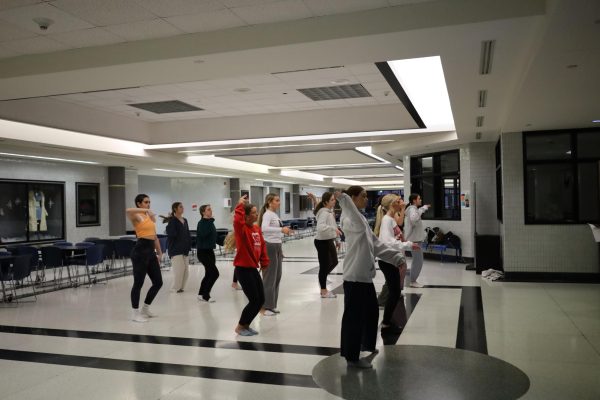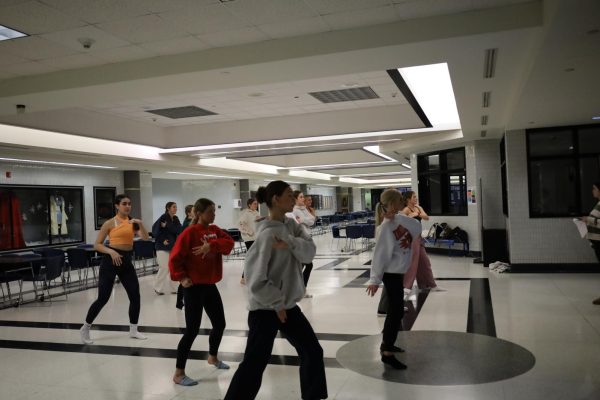Time Troubles: With Daylight Savings having ended, students, teacher weight the costs and benefits of changing school start times
All high school students know the struggle. After a long seven hour day of school, most have extracurricular activities, and afterward come home to hours of homework. This busy schedule paired with an early school start time can make students tired and unable to do their personal best, both academically and with outside activities. In fact, when the CCS school board sent out a survey asking students and parents what changes they would like to see made to the school calendar and schedule, a popular suggestion was for a later high school starting time. CHS students and teachers, however, have varying opinions on this topic.
“I would love for school to start later next year, even if it was only by thirty minutes. I really think sleep is very important. In high school we have so much work and are staying up late so it would be nice to get some extra sleep in the morning,” sophomore Layla Qureshi said.
Schools around CHS, like Zionsville and Brownsburg, have implemented later school starting times. Anatomy teacher Erin Odya can link benefits of this potential change to science.
“During teenage years your heightened awareness is later in the day than it is with the younger elementary school kids. The way the circadian cycling happens is that little kids can be up and ready for the day at 5:30, but as you get older it gets later and later. Teenagers also feel more capable of staying up later, but then it starts to go back the other way,” Odya explained.
Odya recognizes the benefits of the later start time, but also thinks it will not be beneficial later in life.
“In college you’re going to have eight o’clock classes as there’s really no way to get around it and then you’re going to have to go to work everyday at eight. The current start time kind of works on training your brain to have to start working earlier than you want it to,” Odya said.
Odya also views a later start time as a negative from a teacher’s point of view. She values the ability to end her work day with enough time to be able to fit in errands and other responsibilities. She notes that many businesses don’t open before teachers need to arrive at work and they therefore have no choice but to schedule appointments after school.
Sophomore Gabriella Smith thinks that if a later school start time is implemented, students will just adjust to the slight change and become tired again.
“I think it’s important to have school start at a later time, but I don’t think it will make us overall less tired, plus it probably means that all my activities will have to be pushed back as well. I don’t know how that will help my schedule,” Smith said.
While there are arguments for both sides, Qureshi believes the benefits outweigh the drawbacks.
“The difference it makes in the morning with a later wake up time would be more impactful than the difference it makes in the afternoon.”
Your donation will support the student journalists of Carmel High School - IN. Your contribution will allow us to purchase equipment and cover our annual website hosting costs.


































![British royalty are American celebrities [opinion]](https://hilite.org/wp-content/uploads/2024/03/Screenshot-2024-03-24-1.44.57-PM.png)



















![Review: Quiet on Set: The Dark Side of Kids TV is the long awaited exposé of pedophilia within the children’s entertainment industry [MUSE]](https://hilite.org/wp-content/uploads/2024/04/unnamed.jpg)
![Review: “The Iron Claw” cannot get enough praise [MUSE]](https://hilite.org/wp-content/uploads/2024/04/unnamed.png)
![Review: “The Bear” sets an unbelievably high bar for future comedy shows [MUSE]](https://hilite.org/wp-content/uploads/2024/03/unnamed.png)
![Review: “Mysterious Lotus Casebook” is an amazing historical Chinese drama [MUSE]](https://hilite.org/wp-content/uploads/2024/03/0.webp)
![Thea Bendaly on her Instagram-run crochet shop [Biz Buzz]](https://hilite.org/wp-content/uploads/2024/03/IMG_0165-1200x838.jpg)
![Review in Print: Maripaz Villar brings a delightfully unique style to the world of WEBTOON [MUSE]](https://hilite.org/wp-content/uploads/2023/12/maripazcover-1200x960.jpg)
![Review: “The Sword of Kaigen” is a masterpiece [MUSE]](https://hilite.org/wp-content/uploads/2023/11/Screenshot-2023-11-26-201051.png)
![Review: Gateron Oil Kings, great linear switches, okay price [MUSE]](https://hilite.org/wp-content/uploads/2023/11/Screenshot-2023-11-26-200553.png)
![Review: “A Haunting in Venice” is a significant improvement from other Agatha Christie adaptations [MUSE]](https://hilite.org/wp-content/uploads/2023/11/e7ee2938a6d422669771bce6d8088521.jpg)
![Review: A Thanksgiving story from elementary school, still just as interesting [MUSE]](https://hilite.org/wp-content/uploads/2023/11/Screenshot-2023-11-26-195514-987x1200.png)
![Review: When I Fly Towards You, cute, uplifting youth drama [MUSE]](https://hilite.org/wp-content/uploads/2023/09/When-I-Fly-Towards-You-Chinese-drama.png)
![Postcards from Muse: Hawaii Travel Diary [MUSE]](https://hilite.org/wp-content/uploads/2023/09/My-project-1-1200x1200.jpg)
![Review: Ladybug & Cat Noir: The Movie, departure from original show [MUSE]](https://hilite.org/wp-content/uploads/2023/09/Ladybug__Cat_Noir_-_The_Movie_poster.jpg)
![Review in Print: Hidden Love is the cute, uplifting drama everyone needs [MUSE]](https://hilite.org/wp-content/uploads/2023/09/hiddenlovecover-e1693597208225-1030x1200.png)
![Review in Print: Heartstopper is the heartwarming queer romance we all need [MUSE]](https://hilite.org/wp-content/uploads/2023/08/museheartstoppercover-1200x654.png)






























![Joseph Broman, Mu Alpha Theta sponsor, grades tests for his honors precalculus/trigonometry class. Broman said, “I’m retiring from the Math Club next year and I’m just going to do Mu Alpha Theta so I can focus on that one and we can do more [speaker series] first semester.”](https://hilite.org/wp-content/uploads/2024/03/IMG_9502-600x450.jpg)